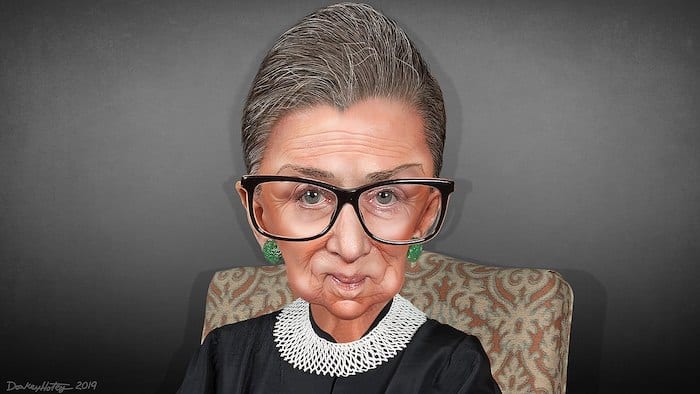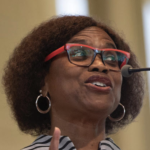
A loss for all Americans—even the ones who don’t realize it
Like so many other Americans across the country, I am mourning US Associate Justice Ruth Bader Ginsburg, who died last month due to complications from metastatic pancreatic cancer. She was 87.
As a soft-spoken firebrand and feminist icon, Ginsburg leaves a titanic influence on the law, a legacy unmatched by any other jurists. A feisty octogenarian on the Supreme Court bench, she became a pop-culture phenom, her image on T-shirts and mugs, with a 2018 film depicting Ginsburg’s life as an attorney inspiring a whole new wave of girls to follow in her footsteps.
She followed in the footsteps of a legal giant, too. Ginsburg was called the Thurgood Marshall of the 1970s women’s movement. In referring to Marshall in a 2014 interview, she said, “He was my model as a lawyer.” Referencing the landmark 1954 SCOTUS decision Brown v. Board of Education of Topeka, Ginsburg added, “You mentioned that I took a step-by-step, incremental approach; well, that’s what he did until he had those building blocks to end separate-but-equal.”
One of Ginsburg’s famous dissents was the 2007 case, Ledbetter v. Goodyear Tire and Rubber Company, regarding gender discrimination. Lilly Ledbetter argued pay disparity because of her gender, citing it as a violation of Title VII of the Civil Rights Act of 1964. A 5–4 vote favored Goodyear; Ginsburg wrote the dissenting opinion, stating, “Pay disparities often occur, as they did in Ledbetter’s case, in small increments; cause to suspect that discrimination is at work develops over time. Comparative pay information, moreover, is often hidden from the employee’s view.” In a bold move, Ginsburg read her dissent publicly from the bench. In 2009, President Barack Obama signed the Lilly Ledbetter Fair Pay Act, making it easier for women to challenge wage discrimination.
Ginsburg fought not only for women’s rights but also LGBTQ+ rights (Obergefell v. Hodges), African American voting rights (Shelby County v. Holder), the rights of persons with disabilities (Olmstead v. L.C.), and environmental justice (Earth v. Laidlaw Environmental Services), for starters. Her lens on justice was intersectional before the word became popular, in part because of her identifying with a persecuted group.
“My heritage as a Jew and my occupation as a judge fit together symmetrically,” Ginsburg said in a 2004 speech at the US Holocaust Memorial Museum. The first Jewish woman to sit on the Supreme Court, she died on the eve of Rosh Hashanah, the Jewish new year; according to Jewish tradition, one who dies on this high holiday is a “tzaddik,” a person of great righteousness. “The demand for justice runs through the entirety of Jewish history and Jewish tradition,” she said in the same 2004 speech. “I take pride in and draw strength from my heritage.”
Ginsburg’s death comes as a crushing blow to those of us who believe in building a multicultural democracy and a participatory government, where protests are understood as a citizen’s First Amendment right. As Ginsburg is laid to rest, a fierce fight has unfolded over her successor at a time of intense political polarization, and just weeks away from a presidential election. In her final days, Ginsburg reportedly told her granddaughter, My most fervent wish is that I will not be replaced until a new president is installed. But as this column goes to print, the president is about to announce his nominee to fill the seat.
As this battle ensues, thousands of women have gathered at vigils across the country to mourn and celebrate the life and work of this feminist icon and trailblazer. Ginsburg’s 27 years on the nation’s high court as a preeminent litigator played an epic role in advancing women’s rights, gender equity, and civil rights. She was a voice for all Americans whose advocacy for justice was unwavering, and she will be forever recognized for it. As Ginsburg said in a 2015 interview, she “would like to be remembered as someone who used whatever talent she had to do her work to the very best of her ability. And to help repair tears in her society, to make things a little better.”
Rev. Irene Monroe can be heard on the podcast and standing Boston Public Radio segment ALL REV’D UP on WGBH (89.7 FM). Monroe’s syndicated religion columns appear and the Boston voice for Detour’s African American Heritage Trail. She is a s a Visiting Researcher in the Religion and Conflict Transformation Program at Boston University School of Theology.

